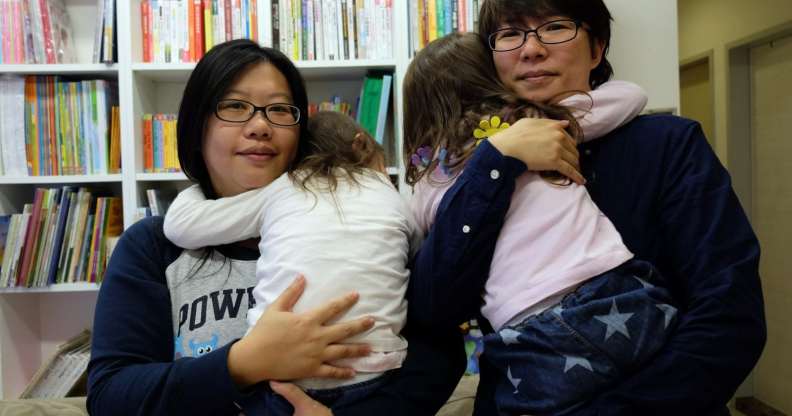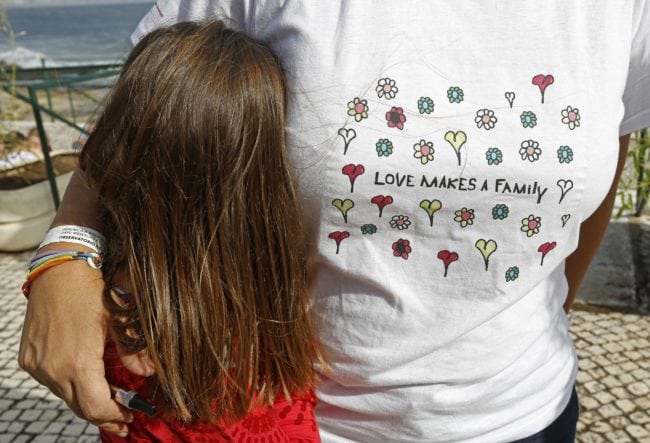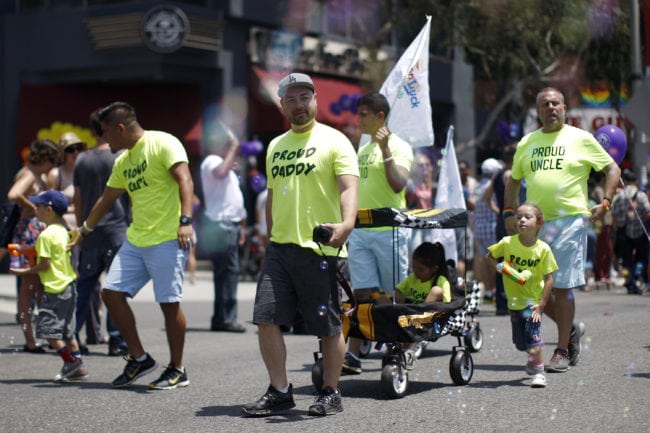Same-sex couples make perfectly good parents, study indicates

Same-sex parents Hope Chen (L), 37, and Zoro Wen, 34, pose with their twin daughters at their home in Taoyuan, northern Taiwan (Photo by Sam Yeh/ AFP/Getty Images)
Children of same-sex couples showed fewer psychological problems than children of heterosexual couples, a new research on sexual orientation and parenthood conducted in Italy found.
The study, titled “Same-Sex and Different-Sex Parent Families in Italy: Is Parents’ Sexual Orientation Associated with Child Health Outcomes and Parental Dimensions?” and published in the peer-reviewed Journal of Developmental and Behavioral Pediatrics, surveyed 70 gay fathers, 125 lesbian mothers, and 195 heterosexual parents living in Italy with children aged 3 to 11 years.
The participants were asked questions related to their background and sexual orientation as well as their confidence in their parental abilities and in their relationship. The responses to the anonymous online questionnaire showed that out of the groups surveyed, gay fathers had the highest level of confidence and satisfaction in their parental roles, relationship and family life.

A child and her mother take part in the 4th European Meeting of Rainbow Families for gay, bisexual and transgender persons in Oeiras on the outskirts of Lisbon on October 17, 2015 (Photo by Jose Manuel Ribeiro/AFP/Getty Images)
“It would seem that [gay fathers] tend to have associated better outcomes and actually are not the ones who need additional support in terms of improving children’s outcomes; yet, they are wrongly identified as possibly being worse at parenting,” the study indicated.
The researchers, who were based at the Sapienza University of Rome, Italy, and the Population Research Center at the University of Texas at Austin, US, also noted that gay fathers who responded to the survey were “significantly older, economically better off, better educated, and in a more stable relationship” compared to the lesbian mothers or heterosexual parents. Those are all considered to be “well-known predictors of better child and parent outcomes”—even better ones, possibly, than parents’ sexual orientation.
“Our findings should warn policy makers against making assumptions on the basis of sexual orientation that certain people are more suited than others to be parents or that some people should be restricted from accessing fertility treatments, as is currently the case in Italy,” the researchers concluded, referring to anti-LGBT families attitudes among Italian lawmakers.

Gay fathers and their children march in the LA Pride Parade on June 8, 2014 in West Hollywood, California. The LA Pride Parade and weekend events this year are emphasizing transgender rights and issues (Photo by David McNew/Getty Images)
The research presented a number of limitations—its sample reflected predominantly urban, white European, and middle-class parents and is thus not representative of the general population, and the self-evaluation survey may reflect conscious or unconscious bias in presenting one’s experiences.
Nonetheless, the study’s findings are consistent with previous studies on the subject, such as a research published in the Medical Journal of Australia in October, which showed children raised by same-sex parents did as well emotionally, socially and educationally as their peers who grow up with heterosexual parents—what hurt children of LGBT+ people, that study showed, was discriminatory attitudes.

